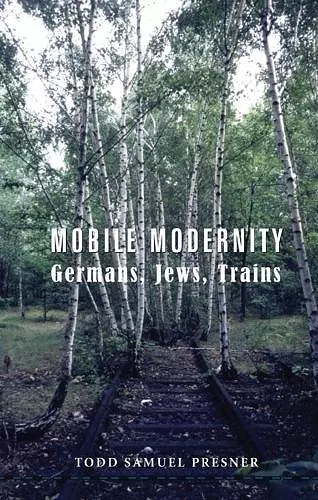Mobile Modernity
Germans, Jews, Trains
Format:Hardback
Publisher:Columbia University Press
Published:11th May '07
Currently unavailable, and unfortunately no date known when it will be back

Todd Presner's Mobile Modernity is outstanding, impeccably organized, strikingly original, and beautifully written. The book achieves the perfect balance between theoretical sophistication and readability. -- Jonathan Hess, University of North Carolina at Chapel Hill This book belongs to the next wave of German cultural studies in that it is radically interdisciplinary just as it effortlessly crosses national and linguistic, and even temporal, boundaries. -- Scott Spector, University of Michigan Reading the texts of a culture that could only achieve its Germanness by being so utterly Jewish, along the lines of the 20th-century's terminal mass migrations, Todd Presner's book opens our 21st-century eyes to a new way to narrate--and to be obsessed with--the Holocaust, i.e. that which will never be arrested in concepts because it forever exceeds our conventional thought and imagination. -- Hans Ulrich Gumbrecht, Stanford University
Though the history of the German railway system is often associated with the transportation of Jews to labor and death camps, this work looks instead to the completion of the first German railway lines and their role in remapping the cultural geography and intellectual history of Germany's Jews.Though the history of the German railway system is often associated with the transportation of Jews to labor and death camps, Todd Presner looks instead to the completion of the first German railway lines and their role in remapping the cultural geography and intellectual history of Germany's Jews. Treating the German railway as both an iconic symbol of modernity and a crucial social, technological, and political force, Presner advances a groundbreaking interpretation of the ways in which mobility is inextricably linked to German and Jewish visions of modernity. Moving beyond the tired model of a failed German-Jewish dialogue, Presner emphasizes the mutual entanglement of the very categories of German and Jewish and the many sites of contact and exchange that occurred between German and Jewish thinkers. Turning to philosophy, literature, and the history of technology, and drawing on transnational cultural and diaspora studies, Presner charts the influence of increased mobility on interactions between Germans and Jews. He considers such major figures as Kafka, Heidegger, Arendt, Freud, Sebald, Hegel, and Heine, reading poetry next to philosophy, architecture next to literature, and railway maps next to cultural history. Rather than a conventional, linear history that culminates in the tragedy of the Holocaust, Presner produces a cultural mapping that articulates a much more complex story of the hopes and catastrophes of mobile modernity. By focusing on the spaces of encounter emblematically represented by the overdetermined triangulation of Germans, Jews, and trains, he introduces a new genealogy for the study of European and German-Jewish modernity.
Beautifully crafted... [Presner's] superbly grounded work engages its texts and its readers so well. -- Kevin S. Amidon German Studies Review highly successful, oftentimes brilliant, reconstruction of... German/Jewish historical dialectic. Journal of Modern History
ISBN: 9780231140126
Dimensions: unknown
Weight: unknown
368 pages